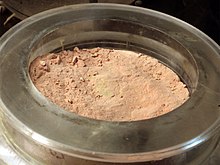 A sample of plutonium tetrafluoride produced at the Hanford Site during the Cold War | |

| |
| Names | |
|---|---|
| IUPAC name Plutonium(IV) fluoride | |
| Other names Plutonium tetrafluoride | |
| Identifiers | |
| CAS Number | |
| 3D model (JSmol) | |
| ChemSpider | |
| PubChem CID | |
| CompTox Dashboard (EPA) | |
InChI
| |
SMILES
| |
| Properties | |
| Chemical formula | PuF4 |
| Molar mass | 320 g/mol |
| Appearance | reddish-brown monoclinic crystals |
| Density | 7.1 g/cm |
| Melting point | 1,027 °C (1,881 °F; 1,300 K) |
| Structure | |
| Crystal structure | Monoclinic, mS60 |
| Space group | C12/c1, No. 15 |
| Except where otherwise noted, data are given for materials in their standard state (at 25 °C , 100 kPa).
| |
Plutonium(IV) fluoride is a chemical compound with the formula PuF4. This salt is generally a brown solid but can appear a variety of colors depending on the grain size, purity, moisture content, lighting, and presence of contaminants. Its primary use in the United States has been as an intermediary product in the production of plutonium metal for nuclear weapons usage.
Formation
Plutonium(IV) fluoride is produced in the reaction between plutonium dioxide (PuO2) or plutonium(III) fluoride (PuF3) with hydrofluoric acid (HF) in a stream of oxygen (O2) at 450 to 600 °C. The main purpose of the oxygen stream is to avoid reduction of the product by hydrogen gas, small amounts of which are often found in HF.
- PuO2 + O2 + 4 HF → PuF4 + O2 + 2 H2O
- 4 PuF3 + O2 + 4 HF → 4 PuF4 + 2 H2O
Laser irradiation of plutonium hexafluoride (PuF6) at wavelengths under 520 nm causes it to decompose into plutonium pentafluoride (PuF5) and fluorine; if this is continued, plutonium(IV) fluoride is obtained.
Properties
In terms of its structure, solid plutonium(IV) fluoride features 8-coordinate Pu centers interconnected by doubly bridging fluoride ligands.
Reaction of plutonium tetrafluoride with barium, calcium, or lithium at 1200 °C give Pu metal:
- PuF4 + 2 Ba → 2 BaF2 + Pu
- PuF4 + 2 Ca → 2 CaF2 + Pu
- PuF4 + 4 Li → 4 LiF + Pu

References
- Lide, David R. (1998), Handbook of Chemistry and Physics (87 ed.), Boca Raton, Florida: CRC Press, pp. 4–76, ISBN 0-8493-0594-2
- Pfeiffer, Martin (March 3, 2019). "FOI 2019-00371.Loaded powder pan at RMC line". Pfeiffer Nuclear Weapon and National Security Archive. Retrieved May 23, 2019.
- ^ United States Department of Energy (1997). Linking Legacies: Connecting the Cold War Nuclear Weapons Production Processes to Their Environmental Consequences (PDF). Washington D.C.: United States Department of Energy. pp. 184, passim.
- ^ Baldwin, Charles E.; Navratil, James D. (1983-05-19). "Plutonium Process Chemistry at Rocky Flats". In Carnall, William T.; Choppin, Gregory R. (eds.). Plutonium Chemistry. ACS Symposium Series. Vol. 216. AMERICAN CHEMICAL SOCIETY. pp. 369–380. doi:10.1021/bk-1983-0216.ch024. ISBN 9780841207721.
- ^ Christensen, Eldon L.; Grey, Leonard W.; Navratil, James D.; Schulz, Wallace W. (1983-05-19). "Present Status and Future Directions of Plutonium Process Chemistry". In Carnall, William T.; Choppin, Gregory R. (eds.). Plutonium Chemistry. ACS Symposium Series. Vol. 216. AMERICAN CHEMICAL SOCIETY. pp. 349–368. doi:10.1021/bk-1983-0216.ch023. ISBN 9780841207721. OSTI 6781635.
- Gmelins Handbuch der anorganischen Chemie, System Nr. 71, Transurane, Teil C, pp. 104–107.
- 4670239, Rabideau, Sherman W. & Campbell, George M., "Photochemical preparation of plutonium pentafluoride", issued 1987-06-02
- Greenwood, Norman N.; Earnshaw, Alan (1997). Chemistry of the Elements (2nd ed.). Butterworth-Heinemann. ISBN 978-0-08-037941-8.
- Pfeiffer, Martin (March 3, 2019). "PuF4 Pics ORO 2019 00475-FN Final Response 20190312_Page_07_Image_0001". Pfeiffer Nuclear Weapon and National Security Archive. Retrieved May 23, 2019.
| Plutonium compounds | |
|---|---|
| Plutonium(II) | |
| Plutonium(III) | |
| Plutonium(IV) | |
| Plutonium(V) | |
| Plutonium(VI) | |
| Plutonium(VIII) | |
| Halides of actinides | |||||||||||||||||||||||||||||||||||||||||||||||||||||||||||||||||||||||||||||||
|---|---|---|---|---|---|---|---|---|---|---|---|---|---|---|---|---|---|---|---|---|---|---|---|---|---|---|---|---|---|---|---|---|---|---|---|---|---|---|---|---|---|---|---|---|---|---|---|---|---|---|---|---|---|---|---|---|---|---|---|---|---|---|---|---|---|---|---|---|---|---|---|---|---|---|---|---|---|---|---|
| |||||||||||||||||||||||||||||||||||||||||||||||||||||||||||||||||||||||||||||||